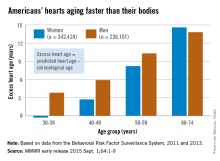Women may live longer than men, but it’s not because they are younger at heart, according to an MMWR report released Sept. 1.
In the first study offering population-level estimates of heart age, women in the oldest age group, 60-74 years, had older hearts than did men of the same age. The excess heart age for the women was 14.6 years, compared with 13.8 years for men, said Quanhe Yang, Ph.D., of the Centers for Disease Control and Prevention, Atlanta, and his associates. Excess heart age is predicted heart age minus chronological age.
The situation was reversed in the youngest age group: Women aged 30-39 years had an excess heart age of –0.3 years and men had an excess heart age of 3.8 years, they said. The women, in other words, had hearts that were younger than their chronological age.
The concept of heart age was introduced in 2008 by the Framingham Heart Study. “Heart age is the predicted age of [a person’s] heart and blood vessels based on their blood pressure, weight, and smoking and diabetes status,” the investigators explained.
The study used data from 578,525 participants in the Behavioral Risk Factor Surveillance System in 2011 and 2013.


